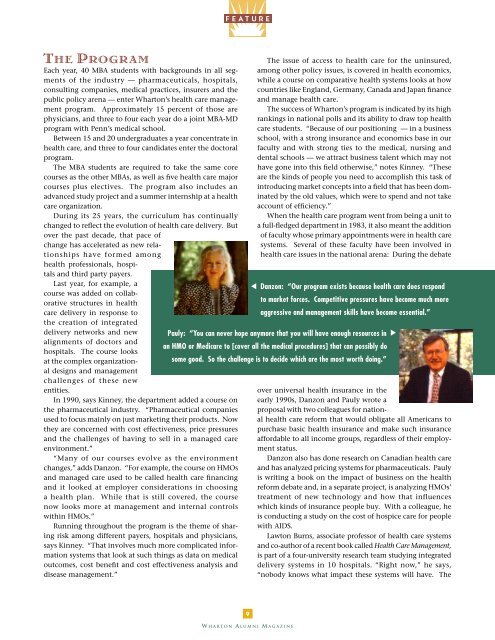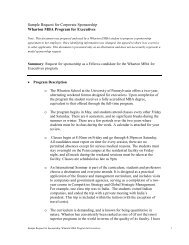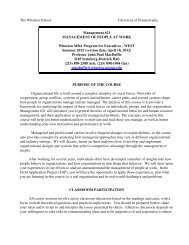FEATURETHE PROGRAMEach year, 40 MBA students with backgrounds in all segmentsof the industry — pharmaceuticals, hospitals,consulting companies, medical practices, insurers and thepublic policy arena — enter <strong>Wharton</strong>’s <strong>health</strong> <strong>care</strong> managementprogram. Approximately 15 percent of those arephysicians, and three to four each year do a joint MBA-MDprogram with Penn’s medical school.Between 15 and 20 undergraduates a year concentrate in<strong>health</strong> <strong>care</strong>, and three to four candidates enter the doctoralprogram.The MBA students are required to take the same corecourses as the other MBAs, as well as five <strong>health</strong> <strong>care</strong> majorcourses plus electives. The program also includes anadvanced study project and a summer internship at a <strong>health</strong><strong>care</strong> organization.During its 25 years, the curriculum has continuallychanged to reflect the evolution of <strong>health</strong> <strong>care</strong> delivery. Butover the past decade, that pace ofchange has accelerated as new relationshipshave <strong>for</strong>med among<strong>health</strong> professionals, hospitalsand third party payers.Last year, <strong>for</strong> example, acourse was added on collaborativestructures in <strong>health</strong><strong>care</strong> delivery in response tothe creation of integrateddelivery networks and newalignments of doctors andhospitals. The course looksat the complex organizationaldesigns and managementchallenges of these newentities.In 1990, says Kinney, the department added a course onthe pharmaceutical industry. “Pharmaceutical companiesused to focus mainly on just marketing their products. Nowthey are concerned with cost effectiveness, price pressuresand the challenges of having to sell in a managed <strong>care</strong>environment.”“Many of our courses evolve as the environmentchanges,” adds Danzon. “For example, the course on HMOsand managed <strong>care</strong> used to be called <strong>health</strong> <strong>care</strong> financingand it looked at employer considerations in choosinga <strong>health</strong> plan. While that is still covered, the coursenow looks more at management and internal controlswithin HMOs.”Running throughout the program is the theme of sharingrisk among different payers, hospitals and physicians,says Kinney. “That involves much more complicated in<strong>for</strong>mationsystems that look at such things as data on medicaloutcomes, cost benefit and cost effectiveness analysis anddisease management.”▼The issue of access to <strong>health</strong> <strong>care</strong> <strong>for</strong> the uninsured,among other policy issues, is covered in <strong>health</strong> economics,while a course on comparative <strong>health</strong> systems looks at howcountries like England, Germany, Canada and Japan financeand manage <strong>health</strong> <strong>care</strong>.The success of <strong>Wharton</strong>’s program is indicated by its highrankings in national polls and its ability to draw top <strong>health</strong><strong>care</strong> students. “Because of our positioning — in a businessschool, with a strong insurance and economics base in ourfaculty and with strong ties to the medical, nursing anddental schools — we attract business talent which may nothave gone into this field otherwise,” notes Kinney. “Theseare the kinds of people you need to accomplish this task ofintroducing market concepts into a field that has been dominatedby the old values, which were to spend and not takeaccount of efficiency.”When the <strong>health</strong> <strong>care</strong> program went from being a unit toa full-fledged department in 1983, it also meant the additionof faculty whose primary appointments were in <strong>health</strong> <strong>care</strong>systems. Several of these faculty have been involved in<strong>health</strong> <strong>care</strong> issues in the national arena: During the debateDanzon: “Our program exists because <strong>health</strong> <strong>care</strong> does respondto market <strong>for</strong>ces. Competitive pressures have become much moreaggressive and management skills have become essential.”Pauly: “You can never hope anymore that you will have enough resources inan HMO or Medi<strong>care</strong> to [cover all the medical procedures] that can possibly dosome good. So the challenge is to decide which are the most worth doing.”▼over universal <strong>health</strong> insurance in theearly 1990s, Danzon and Pauly wrote aproposal with two colleagues <strong>for</strong> national<strong>health</strong> <strong>care</strong> re<strong>for</strong>m that would obligate all Americans topurchase basic <strong>health</strong> insurance and make such insuranceaf<strong>for</strong>dable to all income groups, regardless of their employmentstatus.Danzon also has done research on Canadian <strong>health</strong> <strong>care</strong>and has analyzed pricing systems <strong>for</strong> pharmaceuticals. Paulyis writing a book on the impact of business on the <strong>health</strong>re<strong>for</strong>m debate and, in a separate project, is analyzing HMOs’treatment of new technology and how that influenceswhich kinds of insurance people buy. With a colleague, heis conducting a study on the cost of hospice <strong>care</strong> <strong>for</strong> peoplewith AIDS.Lawton Burns, associate professor of <strong>health</strong> <strong>care</strong> systemsand co-author of a recent book called Health Care Management,is part of a four-university research team studying integrateddelivery systems in 10 hospitals. “Right now,” he says,“nobody knows what impact these systems will have. The9W HARTON ALUMNI MAGAZINE
FEATUREMark D. Smith, MD, WG’89:executive vice president, TheHenry J. Kaiser Family FoundationOne of the reasons Mark Smithwent to <strong>Wharton</strong> was because he sees“business as both the culprit and thesolution” in the <strong>health</strong> <strong>care</strong> crisis.“The country is profoundly ambivalentabout the corporatization of<strong>health</strong> <strong>care</strong> services,” he says. “Certainaspects of <strong>health</strong> <strong>care</strong> havealways been part of the corporate <strong>for</strong>profitculture, such as pharmaceuticalcompanies and X-ray machines. Butwhat is new is the increasing numberof hospitals, HMOs and physicianservice corporations that are now<strong>for</strong> profit.“People aren’t sure how to feelabout that. We want <strong>health</strong> <strong>care</strong> tobe more business-like, more accountable,more efficient, and we want itto have an ethic of customer servicein ways it certainly doesn’t now. Butit makes us a little queasy to thinkabout return on investment when taking<strong>care</strong> of people with AIDS, <strong>for</strong>example.”Smith is an internist who continuesto do clinical work at San FranciscoGeneral Hospital and has a facultyappointment at UCSF. He also serveson the anti-viral advisory committeeof the FDA, and has chaired the CDC’sHIV prevention advisory committee.While earning his MBA from <strong>Wharton</strong>,he ran the Philadelphia Commissionon AIDS, and after graduation, wasdirector of outpatient services atJohns Hopkins.He is now in Menlo Park, Calif., atthe Kaiser Foundation, an independent<strong>health</strong> <strong>care</strong> philanthropy whosefocus is the <strong>care</strong> of low-income andunderserved Americans and alsoSouth Africans. One of the foundation’sgrant-making priorities is HIVdiseases.The foundation has recently fundeda series of patient education factsheets, provider fact sheets, an interactiveCD-ROM <strong>for</strong> AIDS patients, andneedle exchange and condom distributionprograms.One of the issues in the <strong>health</strong><strong>care</strong> dilemma that should be moreprominently debated is professionalethics, Smith says. “Part of the problemlies in the realm of public policy.How do you establish a public policyenvironment that rewards the best ofthe business model and restricts itsworst, in an industry that does not actlike other industries?“Also, there are clear indicationsof market failure in, <strong>for</strong> example, thefact that 31 million Americans areuninsured. Unless we curb some ofthe unraveling of the traditionalinsurance markets so that there is aplace <strong>for</strong> spreading risk, these peoplewon’t get <strong>care</strong>d <strong>for</strong> very well. Youcould end up with a system that isgreat as long as you are <strong>health</strong>y.“The issue of providing coverage<strong>for</strong> the uninsured involves politicaland financial will. There is not a technicalsolution, no magic bullet way todo it. The question is, do we haveleadership in the political process thatwould make this a priority and builda consensus to handle it? I don’tknow that I see that right now.“People in almost every aspect of<strong>health</strong> <strong>care</strong>, including doctors, nurses,consultants and <strong>health</strong> policy analysts,have lived through 50 years ofan uninterrupted bull market—always more money, bigger hospitals,higher salaries, higher premium levels,more jobs, bigger slices of GNP.That bull market is now over in manysegments. It behooves people all themore to think about what kind of contributionthey want to make.”industry is pursuing them with the hope that they will savemoney and improve quality, but nobody has figured out theright questions to ask or the right in<strong>for</strong>mation to gather.”Kissick, who is also the George Seckel Pepper Professor ofPublic Health and Preventive Medicine and professor of<strong>health</strong> <strong>care</strong> systems, recently published a book called Medicine’sDilemmas: Infinite Needs Versus Finite Resources and isworking on several others. He has also done extensive workwith the state of West Virginia on the cost of medicaleducation.Skip Rosoff is researching the legal implications of usingclinical practice guidelines in court cases. If a doctor treatspatients according to guidelines laid down by a managed<strong>care</strong> organization, <strong>for</strong> example, and if one of the patients suffersdamage because a more costly, more invasive procedurewas not used, “one of the key legal questions is: Can the doctordefend the treatment by saying that he or she was relyingon the guidelines set by the managed <strong>care</strong> organization?”asks Rosoff. “To what extent will the courts allow these clinicalpractice guidelines to be used as a defense?”Faculty research aside, the reasons students choose the<strong>health</strong> <strong>care</strong> major vary. For students who are doctors, themotives are clear: “One of the spurs to our program was thatphysicians saw these changes in <strong>health</strong> <strong>care</strong> coming andthey didn’t want be managed by non-physicians,” saysRosoff. The majority of students, however, aren’t doctors.For them, suggests Pauly, “the intellectual, managerial andinterpersonal challenges of managing our <strong>health</strong> <strong>care</strong> systemseem more immediate than doing a deal on Wall Street.”T HE SUCCESSESThe complexity of our <strong>health</strong> <strong>care</strong> system, and the debateover how much <strong>health</strong> <strong>care</strong> should be provided, <strong>for</strong> whom,and at what price, leads to what Kissick calls the Iron Triangleof <strong>health</strong> <strong>care</strong> — “the tension in our society betweenaccess, cost and quality, and our inability to balance allthree, or even two.”The consensus among many educated observers is thatthe successes already achieved by managed <strong>care</strong> in holdingthe line on costs are an excellent start, although <strong>for</strong> consumersthe changes bring certain restrictions, including amore limited choice of doctors and hospitals and closermonitoring of the services covered by their insurance plans.The whole subject of restrictions leads to the increasingrole that rationing, or as some would prefer to call it, resourceallocation, may inevitably come to play in <strong>health</strong> <strong>care</strong> deliverychoices.“Managers need to be taught to ration properly,” saysPauly. “You can never hope anymore that you will haveenough resources in an HMO or in Medi<strong>care</strong> to do all themedical things that can possibly do some good. So the challengeis to decide which are the ones that are most worth10W INTER 1996
















